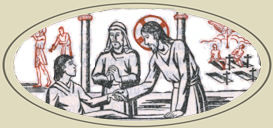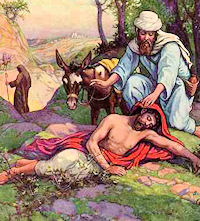» Enjoy our Liturgical Seasons series of e-books!
One of the scribes came to Jesus and asked him, "Which is the first of all the commandments?" Jesus replied, "The first is this: Hear, O Israel! The Lord our God is Lord alone! You shall love the Lord your God with all your heart, with all your soul, with all your mind, and with all your strength.
The second is this: You shall love your neighbor as yourself. There is no other commandment greater than these (Mk 12:28-31)."
Don't forget to pray for the Poor Souls in Purgatory from November 1 to the 8th.
Click here for commentary on the readings in the Extraordinary Form of the Roman Rite.
Sunday Readings
The first reading is taken from Deuteronomy 6:2-6. Moses, having received the Ten Commandments from God on Mount Sinai, set about teaching them to the Israelites.
The second reading is from the first Letter of St. Paul to the Hebrews 7:23-28 where he continues to show the superiority of Jesus over the high priests of the Old Testament.
The Gospel is from Mark 12:28-34. The personal lesson which comes over loud and clear for every sincere Christian from today's gospel, is that the solid foundation of our Christian religion is love of God and neighbor. As our Lord says: "there is no other commandment greater than these." All the other commandments are expansions of these two and indications of how we are to put these two commandments into daily practice. For example: why am I forbidden to murder my neighbor? Simply because he belongs to God; it was God who gave him his life, and God has commanded me to love and respect him. Taking his life is interfering with God's rights, and disobeying him as well. Likewise, the prohibition of idolatry, refraining from insulting God's name, keeping the Sabbath day holy are the principal ways of indicating how we should love God.
One may ask: how can I love God? He is infinitely perfect, he needs nothing from me, what therefore can I do for him? I can understand loving my neighbor—for a neighbor can need help, advice, encouragement and consolation. I can prove my love by giving these to my neighbor, but God has no such needs. It is quite true that true love is not theoretical but pragmatic, it means doing some good for somebody. While the infinite God has no needs that I can supply, he has claims on my service, on my respect, on my gratitude—claims so basic and so great that I must be ready to suffer persecution and even death rather than deny or dishonor him (Mt. 5: 10; Lk. 6: 23). It was God who gave me existence and every gift that I have. It was God, through the incarnation of his own divine Son, who made me his adopted child and heir to heaven. Everything that I am and have and hope to be, I owe to God's generosity; therefore, he has an unquestionable right to my gratitude, my reverence, my respect—these are the ways in which I can show my love for him.
The keeping of God's commandments, the prayers of thanksgiving, praise and petition which daily we offer, the attendance at Mass and other liturgical functions, these are the means God gives us of showing our love, our recognition of total dependence on him and our gratitude for all he has done and is doing for us. God does not need any of these signs of our submission and reverence and respect, but we need them absolutely, for they are the means he has given us of fulfilling his purpose in creating us—to share his eternal glory with him. To love God then, is not an obligation imposed on us by some demanding superior but a privilege granted us so that we can become worthy of the greater gifts he has in store for us.
Loving our neighbor—and in the Christian code this means all men no matter what may be their color, race or religion—is, according to our divine Lord, another most effective way of proving to God that we love him. Because of our common humanity we should be inclined to help our fellowmen, our neighbors, but the Christian law spiritualizes this natural inclination, by commanding us to help our neighbor because he is God's child. We are all fellow-children of God, members of the one family. Our heavenly Father loves each one of us and wants our salvation. If we love our common Father we will do all we can to help his other children also to attain salvation. It will earn for us God's favor.
If we observe these two commandments we are "fulfilling the whole law and the prophets,"; we are serving God and showing our gratitude to him for all his goodness to us. The Christian who is following Christ in love is already active in the earthly kingdom of God and traveling safely toward God's eternal kingdom of peace and happiness.
Excerpted from The Sunday Readings by Fr. Kevin O'Sullivan, O.F.M.
 Commentary on the Readings for the Twenty-Third Sunday after Pentecost
Commentary on the Readings for the Twenty-Third Sunday after Pentecost
"When Jesus came to the ruler's house, and saw the flute players and the crowd making a din, He said, 'Begone, the girl is asleep, not dead.' And they laughed Him to scorn. But when the crowd had been put out, He went in and took her by the hand; and the girl arose" (Gospel).
Notice the small flute-playing figures at the left. They represent the crowd of people who laugh their Creator to scorn.
Yet how often we move among them, enjoying what we call "life," even though we may be spiritually dead.
The trumpet-blowing angel at the right, summoning the dead to life, represents how Jesus, after the crowd has been put out by us, raises His Hand over us in absolution, extends His Hand to us in Holy Communion.
St. Paul, too, warns us against these ;enemies of the cross of Christ whose end is ruin, whose god is the belly."
Excerpted from My Sunday Missal, Confraternity of the Precious Blood
Visiting a Cemetery: An indulgence, applicable only to the Souls in Purgatory, is granted to the faithful, who devoutly visit a cemetery and pray, even if only mentally, for the departed. The indulgence is plenary each day from November 1-8; on other days of the year it is a partial indulgence.
Visiting a Church on November 2: A plenary indulgence, applicable only to the souls in purgatory, is granted to the faithful who, on All Souls' Day (or, according to the judgment of the ordinary, on the Sunday preceding or following it, or on the solemnity of All Saints), devoutly visit a church or an oratory and recite an Our Father and the Creed.
Praying for the Faithful Departed: A partial indulgence, applicable only to the souls in purgatory, is granted to the faithful who,
- devoutly visit a cemetery and at least mentally pray for the dead;
- devoutly recite lauds or vespers from the Office of the Dead or the prayer Eternal rest. (Manual of Indulgences, fourth edition, 1999)
Indulgence Requirements:
- To gain a plenary indulgence, in addition to excluding all attachment to sin, even venial sin, it is necessary to perform the indulgent work and fulfill the following three conditions: sacramental Confession, Eucharistic Communion, and prayer for the intention of the Sovereign Pontiff.
- A single sacramental confession suffices for gaining several plenary indulgences, but Holy Communion must be received and prayer for the intention of the Holy Father must be recited for the gaining of each plenary indulgence.
- The three conditions may be fulfilled several days before or after the performance of the prescribed work; it is, however, fitting that Communion be received and the prayer for the intention of the Holy Father be said on the same day the work is performed.
- The condition of praying for the intention of the Holy Father is fully satisfied by reciting one Our Father and one Hail Mary. A plenary indulgence can be acquired only once in the course of the day, a partial indulgence can be acquired multiple times.
- If a visit to a Church or an oratory is required to obtain an indulgence attached to a particular day, this may be accomplished from noon of the preceding day until midnight of the particular day.
Manual of Indulgences, fourth edition, 1999 (Enchridion Indulgentarium)






